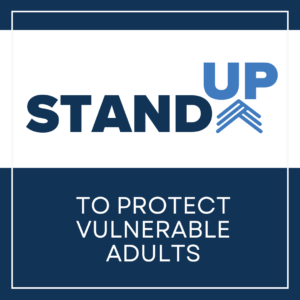In early March of 2020, I was invited to attend an event in Pasadena, CA, where I was introduced to the Evangelical Council for Abuse Prevention. I was very interested that attorneys, insurance companies, and experts were gathering their resources to provide guidance and a measurable standard of care for the vulnerable, through awareness, accreditation and resources. Prior to this, each ministry was on their own in determining what they should do regarding child protection and safety. Yes, there were samples, guidelines, training resources, screening programs, and kits out there. But each ministry could tailor it to what worked best for them, never having an authoritative guide to hold them accountable to sustained child safety practices, or anything that they could look to that would say “You are headed down the right path and always getting better!” As ECAP developed their Standards and resources through the pandemic, I continued to appreciate the progress that had been made.
In the meantime, on the heels of numerous widespread incidents of abuse, but most notably, the Boy Scouts of America litigation and bankruptcy, the legislators in California decided to pass a law in September of 2021, called Assembly Bill 506. In many ways, this expands upon Pennsylvania Bill 1276, which followed the Penn State litigation after the Sandusky trial. Does AB506 replace the work that ECAP has done to prevent abuse in ministries? To sum it up: not even close. Is the new legislation easy to understand and apply to each ministry setting? Nope. What does it do? It gives us the bare minimum of what we ministries must do, as required by the law. While AB506 only applies to ministries in California, this is likely setting a national minimum standard of care that all ministries around the country will eventually need to follow.
AB506 contains requirements pertaining to three areas: Background Checks, Training, and Policies and Procedures. Simple enough? Of course, most ministries are doing these three things, right? Well, our legislators didn’t make it quite so easy and I don’t think that they took into consideration that ministries have been working for years to come up with programs that are tailored to work well in their ministry. In my opinion, this law highlights some important areas, but doesn’t go far enough in its requirements for ministries to keep children safe. Let’s evaluate the pros and cons regarding the law’s requirements.
Background Checks: These must be conducted for all administrators, all employees, and regular volunteers who supervise youth.
Pros: Amen! This makes it pretty simple to navigate at a church. No more deciding who needs to be screened. All employees means exactly that… ALL. If someone gets paid, then they need a background check before they become an employee. All administrators can sound a bit limiting, but in the church, it’s actually quite broad. I’ve consulted with attorneys in California that interpret this to include your “admin team” and your volunteer boards & elders (more on this when we discuss the training component).
I give AB506 another “Amen” in that it now defines which volunteers need a background check. It defines “‘Regular Volunteers”’ as being someone “18 years of age or older and who has direct contact with, or supervision of, children for more than 16 hours per month or 32 hours per year.”
Cons: This isn’t just any background check. AB506 requires a specific background check using fingerprints that is conducted through the California Department of Justice, called “‘Live Scan.” Unfortunately, Live Scan isn’t close to being enough for a sufficient background check. These checks are limited only to data compiled by the California DOJ. So, what more does a ministry need to do? Each ministry will need to add an additional check (or checks) that will search records outside of those that are included in the California DOJ database, because no single background check filters through every database that may contain an individual’s criminal record. In this case, a Live Scan will only check for crimes committed in the state of California. In order to expand your search for other potential criminal charges, the ministry should look into additional background checks beyond what is required. For a fee, the ministry may add an FBI Check. Additionally, a ministry can choose an option to be notified of “Subsequent Arrests,” which means that this is a one-time check (and a one-time fee) for each background check you run. While it is helpful to have the FBI’s seal on your background checks, these are limited as well. So, a ministry will also need to consider using a reputable background check provider that will do a more extensive search beyond what the California DOJ and the FBI include. I list this as a “con,” not because we shouldn’t be doing background checks, but because it is difficult to become authorized to conduct a Live Scan on someone, it may end up being more costly, and it may be inconvenient. No background check is perfect and many in the business of selling background checks tout their checks as being convenient and superior to what is required by law. I’m concerned that ministries will go the path of least resistance, stick with the online background checks, and not keep up the more difficult Live Scan checks. We must now get the California DOJ Live Scan for all those mentioned above, and we should enhance it with the FBI check (at a minimum), add the “Subsequent Arrest Notice,” and consider adding an additional process of using a reputable background check provider.
Training in Child Abuse & Neglect Identification and Child Abuse & Neglect Reporting: This must be conducted for all administrators, all employees, and regular volunteers who supervise youth.
Pros: Personally, this is my favorite part of AB506. Too often, we’ve focused our training efforts on a small segment of those that serve in ministry. However, predators work to find ways where they can gain isolated access to children. Preventing and reporting abuse isn’t just a children’s ministry responsibility, it is an entire ministry’s responsibility. More and more frequently, victims are abused by someone that is part of the church, but not by someone that is part of the children or youth ministries. By training those employees, and board members, they’ll be more aware of inappropriate conduct and signs of abuse. Additionally, there is training on how to specifically report someone’s reasonable suspicion of abuse. By providing training before an incident occurs, we can learn how we should respond, and how to not interfere with a proper investigation.
Cons: What makes this difficult for ministries is that this is different training than what you are probably currently using. The legislation states that this requirement may be met using the free resource that the state has made available. It can be lengthy (6 hours for clergy, 4 hours for employees, 2 hours for volunteers) and there isn’t a convenient administrators’ module built into this system (yet). Some ministries may think that its okay to use whatever training you’ve always been using (that is shorter, easier to administer, and quickly covers the topic), but when the law refers you to specific training that covers specific information and processes, then we can reasonably interpret that the training that we should be doing in our ministry covers those same topics. I think that we can all admit that the church hasn’t done a good job in managing abuse claims in the past, and we can do a better job. Having a substantive training program according to specific standards will get everyone in an organization on the same page regarding abuse reporting.
Policies & Procedures to Prevent and Report Abuse:
Pros: Again, this is great! We now have specifics of what we’ve always been doing. We need policies and procedures for reporting suspected abuse (that we’ve been trained on) to persons or entities outside of the organization. Additionally, the legislation mentions the “Two Adult Rule” and having, “to the greatest extent possible, two mandated reporters present when children are present.”
Cons: Not so fast. Our legislators may not have thought this one all the way through. The first part about reporting abuse, is pretty clear: if you have a reasonable suspicion, then report it to the proper outside authority. Don’t investigate it. Don’t check to see if there is some misunderstanding. Just report it and be prepared to, if necessary and at the appropriate time, minister to those impacted. The problem here is that the verbiage of the actual legislation makes it challenging to follow the law as written.
The first challenge in the legislation is the verbiage that says policies should require two mandated reporters when Workers are in contact with children “to the greatest extent possible,” but it doesn’t define what that really means. As leaders determine what that means in their ministry setting, they should recognize that abuse doesn’t always happen in the presence of another trained, screened, background checked, unrelated adult. Additionally, in an effort to protect our team from false accusations or perceived impropriety, nothing beats the presence of another credible witness.
Another big challenge is that the legislation didn’t change the fact that in California, volunteers are largely not considered to be mandated reporters.[1] These volunteers who supervise youth continue to be “permissive reporters,” must have the appropriate background check, go through training, and are encouraged to prevent abuse. Unfortunately, I don’t believe that the authors of AB506 considered all of these factors when writing this legislation. Until there is more clarity, your ministry’s leadership will need to determine how to navigate this. You may be able to have a policy where all or some volunteers are mandated reporters, but this is something to work out with qualified legal counsel.
Now that AB506 is law in California, is this all that we must do? Not even close. Consider this: No matter what we do, abuse can still happen. Should a child in your ministry be the victim of abuse and your ministry is involved in litigation, a victim’s attorney will likely start with asking for proof that you met the laws in these three areas. If you have, then they’ll likely dig deeper and see what more you could have done to prevent the abuse from occurring. You should be developing a comprehensive Abuse Prevention Program that aligns with the guidance provided in the ECAP Standards. However, if you do everything else to meet the ECAP Standards, but utilize background checks, training material, or policies and procedures that don’t meet state requirements, your other efforts will have been wasted in proving that you’ve met the standard of care in protecting children. Furthermore, ministries outside of California should expect similar laws may be instituted in the near future. By developing a Child Protection Program in alignment with ECAP Standards now, you will be ahead of the game in terms of what your state may one day require. However, remember that our goal in abuse prevention is not just to conform to the letter of the law, but to care for vulnerable individuals made in the image of God who are worthy of dignity and respect.
For more information on AB506 and answers to Frequently Asked Questions on this topic, please visit www.churchwest.com/ab506.
[1] Readers should know that each state has its own laws and requirements regarding Mandated Reporting and who is a Mandated Reporter. See https://mandatedreporter.com for more information.





